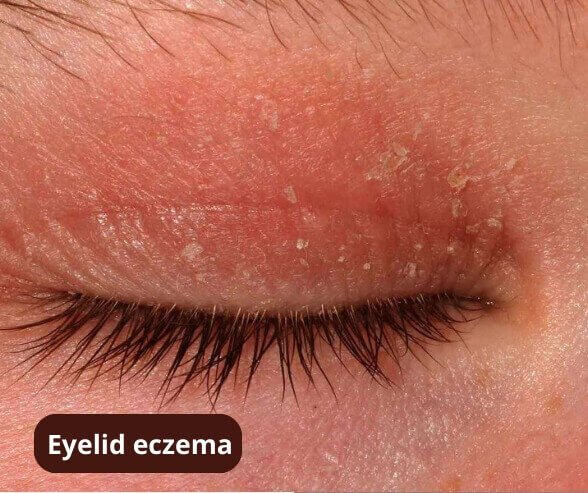Eczema around eyes can be a frustrating and uncomfortable condition that affects many people. This delicate area of skin requires special care and attention, making it essential to understand the causes, symptoms, and treatment options available. In this comprehensive guide, we’ll explore everything you need to know about managing eczema around eyes effectively.
Understanding Eczema Around the Eyes
Eczema, also known as atopic dermatitis, is a chronic skin condition characterized by inflammation, redness, and itchiness. When it occurs around the eyes, it can be particularly troublesome due to the sensitivity of the area. Eyelid eczema, or periocular eczema, can affect both the upper and lower eyelids, as well as the skin surrounding the eyes.
Common Causes of Eczema Around Eyes
Several factors can contribute to the development of eczema around eyes:
- Genetics: A family history of eczema or other allergic conditions can increase your risk.
- Environmental triggers: Exposure to irritants, allergens, or harsh weather conditions can exacerbate symptoms.
- Stress: High levels of stress can trigger or worsen eczema flare-ups.
- Hormonal changes: Fluctuations in hormones, such as during pregnancy or menstruation, can affect eczema symptoms.
- Cosmetics and skincare products: Certain ingredients in makeup, lotions, or eye creams may irritate sensitive skin.
- Contact dermatitis: Allergic reactions to substances that come into contact with the skin around the eyes.
- Medical conditions: Some underlying health issues, like thyroid problems or autoimmune disorders, can contribute to eczema.
Recognizing the Symptoms
Identifying eczema around the eyes is crucial for proper treatment. Common symptoms include:
- Redness and inflammation of the eyelids and surrounding skin
- Dryness and flakiness
- Itching and burning sensation
- Swelling of the affected area
- Rough or scaly patches of skin
- Increased sensitivity to light
- Watery eyes
- Difficulty opening eyes fully due to swelling or discomfort
In some cases, severe eczema around the eyes can lead to complications such as skin infections or changes in eyelid shape. If you experience any of these symptoms, it’s essential to consult a dermatologist or healthcare professional for an accurate diagnosis and appropriate treatment plan.
Diagnosing Eczema Around Eyes
To diagnose eczema around the eyes, a healthcare provider will typically:
- Examine the affected area closely
- Ask about your medical history and any potential triggers
- Inquire about your skincare routine and products used around the eyes
- Possibly perform allergy tests to identify specific triggers
- In some cases, conduct a skin biopsy to rule out other conditions
Treatment Options for Eczema Around Eyes
Managing eczema around the eyes often requires a multi-faceted approach. Here are some effective treatment options:
1. Topical Medications
- Corticosteroid creams: These anti-inflammatory medications can help reduce itching and swelling. However, they should be used cautiously around the eyes and only as prescribed by a doctor.
- Calcineurin inhibitors: Medications like tacrolimus and pimecrolimus can help manage eczema without the side effects associated with long-term steroid use.
- Antihistamines: Topical antihistamines may help relieve itching and reduce allergic reactions.
2. Moisturizers and Emollients
Keeping the skin around your eyes well-hydrated is crucial. Look for fragrance-free, hypoallergenic moisturizers specifically designed for sensitive skin. Apply them regularly, especially after bathing or washing your face.
3. Lifestyle Changes
- Identify and avoid triggers: Keep a journal to track potential triggers and eliminate them from your environment or routine.
- Adjust your skincare routine: Use gentle, fragrance-free cream and avoid rubbing or scratching the affected area.
- Manage stress: Practice relaxation techniques like meditation, yoga, or deep breathing exercises to reduce stress-induced flare-ups.
- Maintain a healthy diet: Some people find that certain foods trigger their eczema. Consider keeping a food diary to identify potential culprits.
4. Natural Remedies
While scientific evidence is limited, some people find relief from natural remedies such as:
- Cold compresses: Applying a cool, damp cloth to the affected area can help soothe inflammation and itching.
- Aloe vera: Known for its anti-inflammatory properties, aloe vera gel may provide relief for some individuals.
- Coconut oil: Its moisturizing and antimicrobial properties may help some people manage eczema symptoms.
Always consult with a healthcare professional before trying any new treatment, including natural remedies.
Preventing Eczema Flare-Ups Around Eyes
Prevention is key when it comes to managing eczema around the eyes. Here are some tips to help reduce the frequency and severity of flare-ups:
- Protect your skin: Use sunscreen and wear sunglasses to shield the delicate skin around your eyes from harmful UV rays.
- Stay hydrated: Drink plenty of water to keep your skin moisturized from the inside out.
- Use a humidifier: Adding moisture to the air can help prevent dry skin, especially during winter months.
- Be gentle: Avoid rubbing or scratching your eyes, and use soft, clean towels to pat the area dry.
- Choose hypoallergenic products: Opt for cosmetics and skincare items specifically formulated for sensitive skin.
- Maintain good hygiene: Wash your hands regularly to avoid transferring irritants to your eyes.
- Get enough sleep: Adequate rest can help reduce stress and promote overall skin health.
When to Seek Professional Help
While mild cases of eczema around the eyes can often be managed at home, it’s important to know when to consult a healthcare provider. Seek medical attention if:
- Your symptoms persist or worsen despite home treatment
- You experience severe pain, swelling, or vision changes
- There are signs of infection, such as increased redness, warmth, or discharge
- Eczema is significantly impacting your quality of life
A dermatologist or ophthalmologist can provide specialized care and may recommend additional treatments, such as phototherapy or systemic medications for severe cases.
Living with Eczema Around the Eyes
Dealing with eczema around the eyes can be challenging, but with proper care and management, many people find relief and maintain healthy skin. Remember that eczema is a chronic condition, and what works for one person may not work for another. Be patient and work closely with your healthcare provider to find the best treatment plan for your individual needs.
By understanding the causes, recognizing symptoms early, and following a consistent skincare routine, you can effectively manage eczema around your eyes and minimize its impact on your daily life. Stay informed about new treatments, and don’t hesitate to reach out to support groups or online communities for advice and encouragement from others who share similar experiences.
With the right approach and care, you can keep your eyes looking and feeling their best, even when dealing with eczema.









